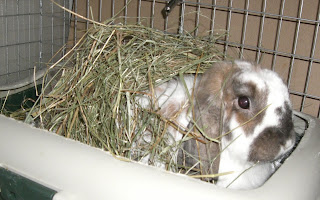In the past, rabbits lived outdoors in hutches and were not considered part of the family. Vets were not well-versed in rabbit medicine and therefore many rabbit issues went unnoticed. However, as rabbits have become more popular (they're the 3rd most common house pet!), many vets have emerged who treat rabbits. Due to this, we've learned more about rabbits in the past decade than ever known before! It's a common misconception that rabbits should eat only carrots...Bugs Bunny loved them, but there's much more to a complete diet than just that.
HAY: The most important thing for a rabbit to eat is HAY! Adult rabbits eat timothy hay (or other blends) which comprises most of their diet. All rabbits should have constant access to soft, green, timothy hay. There are other blends out there (orchard grass, meadow hay, etc.) but timothy is by far the most important and the favorite among many. It's so important for their digestive system and is great for their teeth! Alfalfa hay should not be fed to rabbits over the age of 6 months, since it's too high in protein and calcium for them. Alfalfa is good for rabbits who are growing, but not for adults.

Here's Clover Lop (who is on the lookout for a permanent home) playing in her hay. While some rabbits like hay in their litterbox, others like it in a hay hopper or stuffed in an old tissue box or toilet paper roll!
PELLETS: In addition to timothy hay, rabbits also should eat a timothy-based pellet. Pellets were invented by breeders who wanted a quicker and easier way to feed and fatten their rabbits. The pellets that are appropriate for an adult rabbit are made solely from timothy hay, and should have no alfalfa in them since they're too high in calcium for adult rabbits and can cause health issues like bladder sludge. Pellets can be free fed, but most often are measured according to the size of the rabbit and fed twice a day. Some pellets are sold with colorful pieces in them. Most of these pellets are made from alfalfa meal, and aren't appropriate for adult rabbits. Alfalfa hay is too high in protein and calcium for adult rabbits. We use (and LOVE) Oxbow Bunny Basics T pellets, which is fantastic! You can go on their website (oxbow.com) to find carriers in your area. Most pet stores carry other timothy-based pellet options as well. The House Rabbit Society (rabbit.org) came up with approximate measurements for a healthy rabbit. They suggest,
"5-7 lb of body wt. 1/4 cup daily, 8-10 lb body wt. 1/2 cup daily, 11-15 lb of body wt. 3/4 cup daily"
According to the HRS, a rabbit less that 5 pounds may have digestive troubles if their diet is restricted too much. At Hug-a-Bunny, we do limit the pellets our rabbits get, but not this strictly. If pellets are being measured, it's even more important to make sure fresh hay is accessible at all times and that the rabbit is given more greens.
FRUITS/TREATS: While many people love to give their rabbits treats, we feel that many of the marketed treats aren't good for rabbits. They may be tasty, but often have no nutritional value and may be harmful to your rabbit's health. Instead of giving our rabbits the factory-made treats (with the exception of Oxbow's papaya tablets, which we love), we use fruit as an occasional treat! Whether fresh or dried, rabbits love the sweet taste of some yummy fruit. Check out the House Rabbit Society's list of approved fruits to share with your furry friend! Remember, rabbits have sensitive systems and can't handle too much sweet stuff at once. If you're eating an apple or banana, share a bite with your furry friend- but don't go overboard! Too much of a good thing will cause your companion to have excess cecotrophes or diarhea!
WATER: Make sure your rabbit has constant access to fresh, clean water. We put a water bottle in each cage, but we also put in a ceramic crock to give our rabbits the option of how they prefer to drink their water. We find that most of our rabbits love to drink water out of a bowl. Water is so important to keep a rabbit's gut active and their bladder flushed. Due to the natural vitamins in your rabbit's food, you do NOT need to add vitamins into your rabbit's water.
We hope to have shared some useful information with the rabbit lovers out there! Now, go hug your bunny!


No comments:
Post a Comment